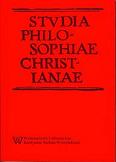Czy prawda może być przemocą?
Can truth be equal to violence?
Author(s): Anna SzklarskaSubject(s): Philosophy, Ethics / Practical Philosophy
Published by: Wydawnictwo Naukowe Uniwersytetu Kardynała Stefana Wyszyńskiego w Warszawie
Keywords: truth; violence; John Paul II
Summary/Abstract: The title of the article is obviously provocative. The author does not think that truth can indeed work or express itself though violence. And yet, those who refer to timeless, natural truths concerning mankind, life and moral issues are often accused of violence and demagogy. Indeed, connections between truth and violence can be detected, however they concern particular attempts at unprecedented manipulations aimed at the truth. Obedience to the truth requires courage and effort and is not an easy matter. Therefore, today truth about the human condition, moral values or civilian obligations is commonly questioned. Violence can play a substantial role in the processes of creation or cognition; it also influences the transformations of knowledge and its meanings in social circulation as Andrzej Zybertowicz points out in his writings. Nowadays people think that, instead of truth, we should focus on the multitudes of individual narrations and of radically subjective interpretations, of which all are equally genuine. Truth itself is reduced to an arbitrarily determined product of authority – also the one held by mass media. The counterbalance to this kind of thinking is the teaching of John Paul II, who in a calm and balanced way reminds us of the relationship between truth and freedom and about the responsibility that truth generates. It is in fact a precisely ethical matter – which attitude mankind takes in its relationship to the truth and if it is ready to serve it. It is amazing that for many people truth is associated with enslavement. The author makes an attempt at explaining what the causes for this unsettling phenomenon are and also in which way the teachings of Pope John Paul II can help us to see the right perspective of the meaning of truth in the life of each individual, both in the aspect of individual consciousness and a collective experience of a nation or the whole of humanity. The article refers to the views of the Pope, expressed both in the encyclical "Veritatis Splendor" and in the context of other texts by John Paul II.
Journal: Studia Philosophiae Christianae
- Issue Year: 51/2015
- Issue No: 3
- Page Range: 139-157
- Page Count: 19
- Language: Polish

